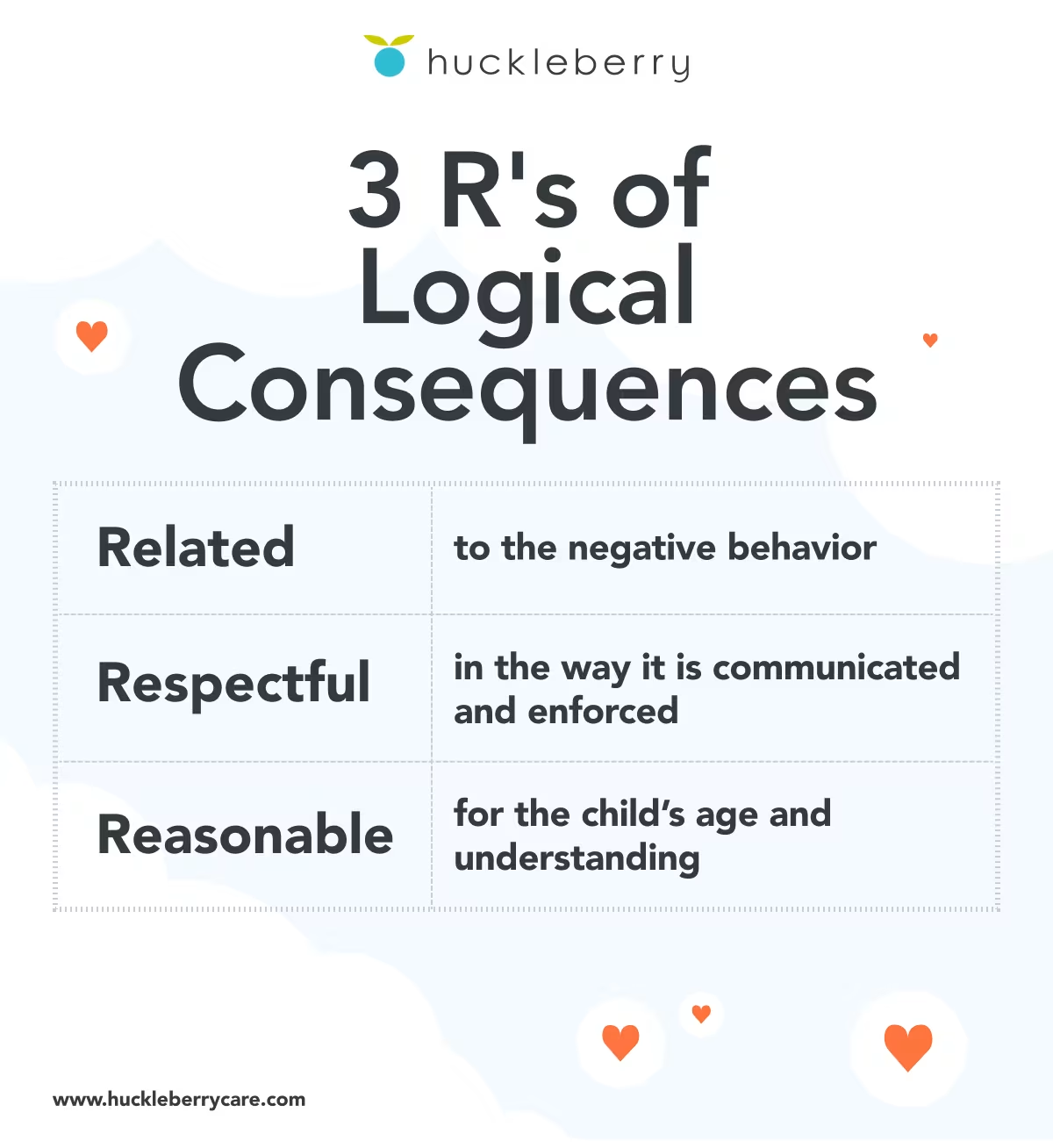Logical consequences: What is, examples, difference from punishments
Updated Aug 14, 2025

Children will cross and push boundaries, they are only human after all! Even if you have read every book in the parenting aisle, bookmarked all articles, and saved all the positive parenting scripts on Instagram, your child at some point will behave in a way that will make you ask yourself: Is it time for a consequence?
Despite what you might have read on social media (conflicting parenting advice is everywhere nowadays), consequences are not bad, they are necessary for healthy development, and the appropriate use of them can actually encourage the development of self-regulation skills [] in children.
Consequences are a great way to help children experience the results of their actions and choices in a positive way, surrounded by safety and support. The top positive parenting programs [] that are backed by research, all involve the use of logical consequences to manage behavior in children.
In positive parenting, a logical consequence is respectfully assigned by the parent, and is reasonable enough for the child to understand and relate to the choice they made. Let’s dive deep into logical consequences and how to apply them in our day-to-day life.
Consequences vs punishments
Consequences are different from punishments because they are not looking to shame the child, instill pain, or enforce power over them. Instead, a consequence is meant to be a learning experience delivered respectfully, with the final objective of teaching the child a skill. When a consequence is not reasonable or respectful towards the child, then it becomes a punishment. While some parents still use spanking and other forms of corporal punishment, physical punishment (such as hitting) is not a logical consequence and can cause more harm than good []. Let’s look at a common scenario and how punishment would differ from a consequence: Your little preschooler is running inside the living room while holding a cup of water and accidentally slips and spills water over the floor. A punishment for this behavior would be sending your child to their room for a time-out.
On the other hand, a logical consequence would look like talking to your child about what happened, reminding them of your “no running with food” rule, and asking them to help clean up the water from the floor. A punishment makes the child feel shame, while the logical consequence helps them reflect on their actions and experience the consequences of their choices.
Examples and scenarios of logical consequences
Every day is an opportunity for your child to learn something new, and consequences are a part of that. Below is a list of logical consequences during common day situations and how they can be applied:
These are examples of common situations with our children, but of course, every child brings their own unique personality and behaviors to the table and you might find yourself trying to come up with a logical consequence on the spot. In order for a logical consequence to align with the positive parenting principles, and not turn into a punishment, remember the 3 R’s of consequences: Related, Respectful, and Reasonable. If the consequence you are establishing is not related to the behavior, then, your child will have trouble understanding the consequences. If you deliver the consequences in a manner that is humiliating or instills fear in the child, then the child will focus on feeling bad and not on the learning opportunities. Finally, the consequence needs to be reasonable and you have to be able to follow through. If you tell your child that they can’t watch TV for a month because they skipped homework one day, this can be unreasonable for both the child and yourself.

4 strategies and tips to integrate logical consequences into daily life
It is normal that children don’t always respond well to consequences (as adults, we struggle with them as well!), but this doesn’t mean that a consequence is not the right choice. As a parent, it is your responsibility to teach your child appropriate behaviors in a firm, but loving way.
Remember that children do better when they feel better, so invest time in connecting with them in order to nurture your parent-child relationship. Additionally, don’t forget to use preventive measures and positive discipline tools to avoid using consequences all the time. Implementing consequences for every single behavior can overwhelm your child (and yourself)! Here are some tips on how to apply consequences in your day-to-day routine:
Tip #1 Don’t take too long to implement the consequence.
The shorter the time between the behavior and the consequence, the better. When too much time passes, your child will have a harder time making the connection between what they did, and how to repair it.
Tip #2 Deliver consequences in an assertive voice.
Childhood is the perfect moment to make mistakes - after all, there is someone guiding you in a safe and respectful manner! When establishing a consequence, make sure to . For example, if your child keeps playing in an unsafe way with their baseball bat after you have explained how to do it correctly, you can say something like: “You are still being unsafe with the baseball bat. Let’s put it away for a while and then we can try to play with it again.”
Tip #3 Lay out consequences before the behavior occurs.
There are many behaviors that might occur frequently, so if the consequence is known ahead of time, its implementation will be smoother. For example, you can have a standing consequence that if the living room toys aren’t cleaned up, there is no outside playtime. Another standing consequence can look like no eating desserts or candies if you forget to brush your teeth. Remember that prevention strategies work really well to help model expected behaviors. If your child constantly forgets to brush their teeth, and you are exhausted from repeating this, a can help them remember better.
Tip #4 Start small.
If the consequences you impose are too big, for example, “no TV for a month” instead of “no TV for a day”, this can cause your child to feel bad about themselves and/or angry, which discourages them from actually learning from the situation. Start small and remember to focus on prevention and connection if you are facing the same behavior frequently.
Share article:
Note: The content on this site is for informational purposes only and should not replace medical advice from your doctor, pediatrician, or medical professional. If you have questions or concerns, you should contact a medical professional.
5 Sources
Share article:











